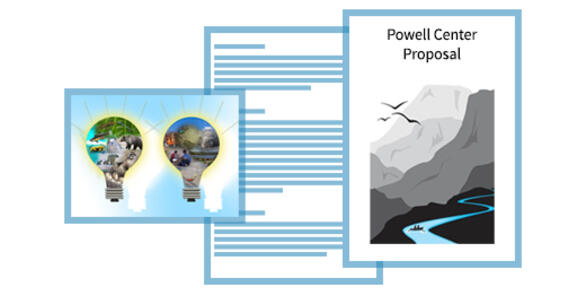Proposal Overview
The Powell Center seeks projects that address development and testing of important Earth system science ideas and theories using existing data, cutting-edge analysis of Earth system information, and use of sound science in policy and management decisions. Proposals are evaluated for scientific merit, novel approaches, and rationale for conducting investigative activities at the Powell Center. The Powell Center Science Advisory Board (SAB) reviews proposals and makes recommendations to the Directors who make the final decisions about which proposals to support. SAB members may not be subject matter experts; write proposals that are understandable and compelling to non-specialists.
A context statement and reviews are returned to principal investigators. Reviews do not reflect SAB meeting discussions, which focus less on specific content than the nature, scope, and innovation of the proposed project.
Proposals that are clearly inappropriate for the Powell Center (e.g., those requesting overhead, funds to be spent at the investigator's home institution, new data collection, exploratory workshops, etc.) will be returned without review.
Who Should Apply
We welcome scientists at any stage of their career, from all disciplines, and from academic or government organizations anywhere in the world. There can be up to four Principal Investigators. At least one of the Principal Investigators must be a USGS employee.
Powell Center does not support:
◦ Collection of new data or field research.
◦ Projects that should be funded by another entity or can be conducted elsewhere.
◦ Proposals requesting overhead or funds to be spent by the investigator at the investigator's home institution.
◦ Supplies, field research travel, or travel to professional society meetings.
Proposal Submission Checklist
Proposals should contain four main elements.
- Cover Sheet:
- Date of submission
- Descriptive title
- Short title – two or five words for use as a project name (25 characters max) (Short titles should be unique as they are used to describe your project to the public. “Climate Change Science” is not unique. “Prairie dogs under climate change” is better
- Principal investigator name(s) and contact information (4 PIs maximum – at least from USGS)
- Project summary
- Proposed start and end dates
- Number and duration (4 day minimum) of Working Group meetings at the Powell Center
- Proposed data release date
- Is this a resubmission? Yes/No (If yes, provide date(s) of original submission)
- Conflicts of interest with reviewers
- Keyword(s) – Please choose keywords from the categories below to describe your project: 1) geospatial 2) ecosystems, 3) energy and minerals, 4) environmental health, 5) natural hazards, 6) water, 7) climate change
- Body of Proposal:
- Problem statement
- Proposed activities
- Names of participants in a table that has columns for name, institutional affiliation, expertise specific to your topic, role in the Working Group, career stage, confirmed?
- Describe how proposal meets gender, ethnicity, and age diversity goals and how the synthesis will address broader impacts to society
- Timetable of activities
- Anticipated results and benefits
- Literature cited
- Curriculum Vitae (CV):
- For each principal investigator and Powell Center Fellow (if identified)
- Data Management Plan:
- Describe datasets and code the Working Group plans to use and produce; find examples on the USGS Data Management website
Send the proposal document in PDF or word format as one file to powellcenter@usgs.gov. For answers to questions not addressed in these instructions, or elsewhere on the website, please email powellcenter@usgs.gov or jill_baron@usgs.gov.



